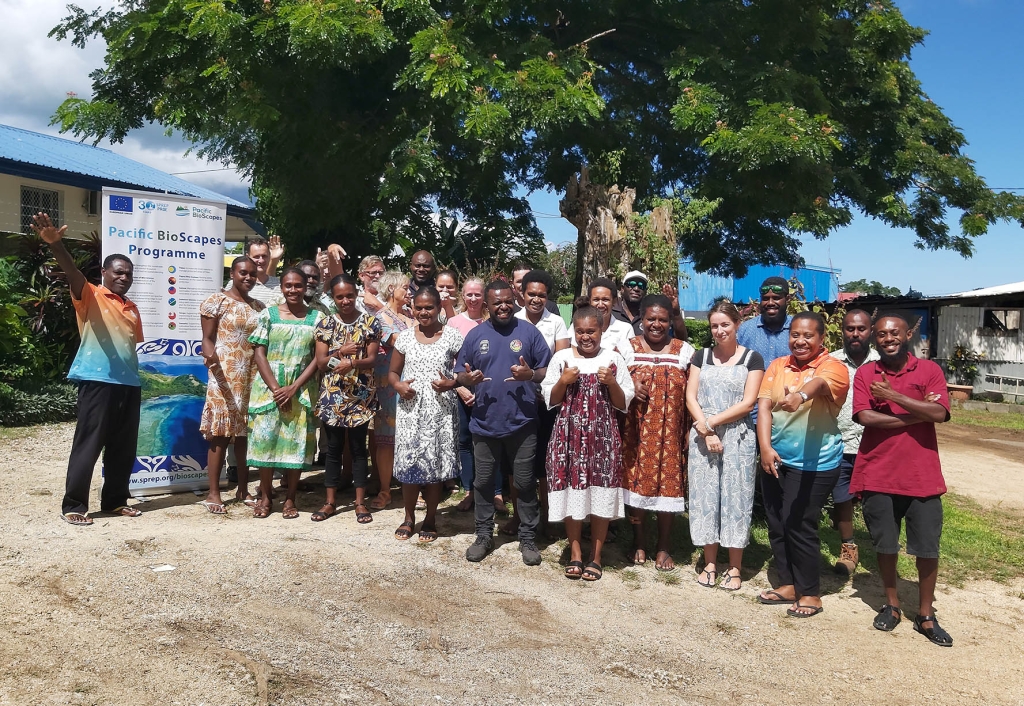
Turtles are an important part of tourism in Vanuatu and tourists can see turtles in the wild in either with a trained guide or independently.
The main species that can be seen here are green, and hawksbill turtles which are listed as threatened species. The Government of Vanuatu is committed to their effective management and conservation as part of global efforts to prevent the extinction of these migratory marine species.
There are many factors that can impact turtle populations including fisheries interactions, pollution especially plastics, insensitive coastal development and impacts of climate change. Poorly managed tourism operations and poor behaviour of tourists can also impact turtles. These include direct contact through touching or holding turtles, impacts on nesting turtles and keeping turtles in captivity for tourists to see. Other impacts include lights on coastal infrastructure, which can disorient hatching turtles.

These issues were recently discussed at a Turtle Tourism Workshop held on 23 April 2024 in Port Vila, Vanuatu. The workshop was an activity implemented by the Pacific BioScapes Programme. The Programme is a European Union (EU) funded action, managed, and implemented by the Secretariat of the Pacific Regional Environment Programme (SPREP). It includes 30 focused activities taking place across a diversity of ecosystems in 11 Pacific Island countries that are addressing critical issues concerning coastal and marine biodiversity, and ecosystem-based responses to climate change adaptation.
The Turtle Tourism Workshop was arranged by the Vanuatu Environmental Science Society and a wide range of stakeholders including responsible government departments, the Vanuatu Tourism Office, NGOs and tourism operators. Participants included Mr Yakav Silas from the Vanuatu Fisheries Department. Mr Silas noted "it’s the right time for the workshop, to educate the people involved in business tourism in wildlife, and how they can contribute to the management of the wildlife."
Ms Edna Taiwia, a student from the National University of Vanuatu was also present. Ms Taiwia said "the workshop is important, there are not many restrictions involving turtle tourism, and there are people not respecting the current laws. The workshop can help find solutions to conserve turtles and educate the public to help preserve the turtles - not only in tourism - but in local villages too."
Building community awareness of best-practice guidelines for wildlife tourism encounters has been a recommendation made in previous turtle assessments in Vanuatu. Following this workshop, the Pacific BioScapes Programme will provide support to the Vanuatu Environmental Science Society to produce best practice guidelines and a code of conduct for tourism operators. This will provide advice on how they can safely and sensitively observe turtles in Vanuatu.
Further opportunities to have input to the guidelines will be available and once they are completed training workshops will then be held in key tourism areas including Efate Island, Espiritu Santo and Aneityum for tourism operators to be introduced to the guidelines and awareness materials in English, French and Bislama languages.
Ms Chloe Molu of the Vanuatu Resource Monitors Network summed up the successful workshop by saying ‘the workshop has been interesting, and there have been some important conversations involving tourism, students and fisheries to discuss the importance of turtle tourism’.
Moving towards best practice for turtle tourism in Vanuatu can help raise the tourism profile of Vanuatu and avoid any negative perceptions that may arise from poorly managed operations.
From this perspective, Ms Karen Baird, the SPREP Threatened and Migratory Species Adviser, saw the "workshop as a great opportunity for operators to learn about turtles and how their operations can improve conservation outcomes for turtles. Also how to improve their operations to create world class tourism products to effectively compete on a global scale."